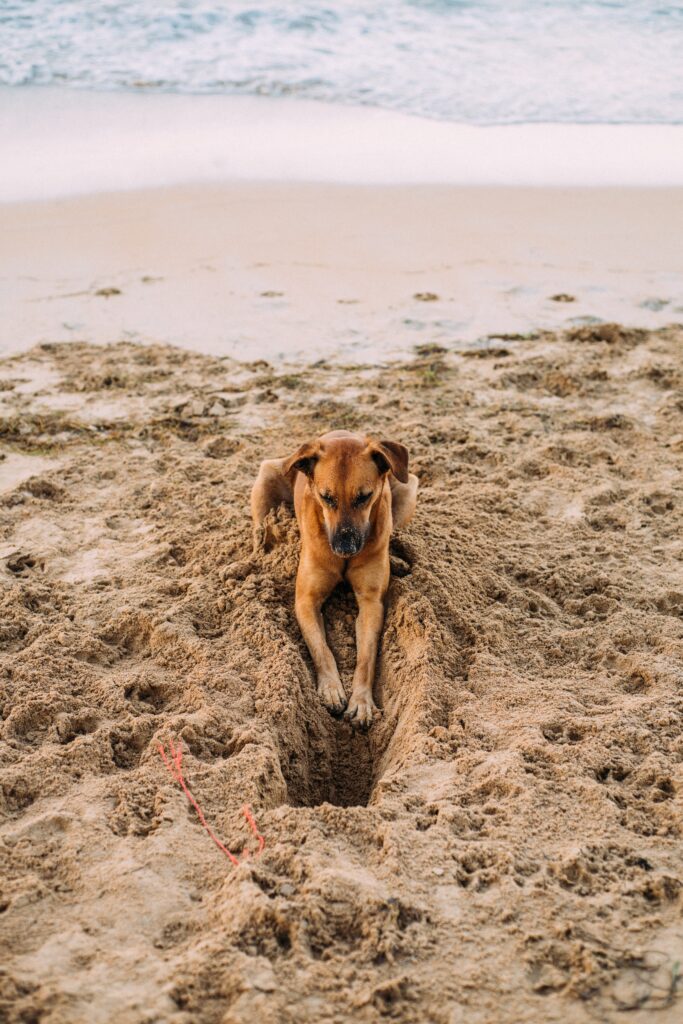
Digging is a natural behavior for dogs, but it can be destructive if your dog is digging in your yard or other areas where you don’t want them to dig. In this blog post, we’ll discuss the reasons why dogs dig, how to determine why your dog is digging, and how to stop them from digging.
Why Do Dogs Dig?
There are many reasons why dogs dig. Some of the most common reasons include:
- Instinct. Digging is an instinctive behavior for dogs that dates back to the days of their wild ancestors. Wolves and other wild dogs would dig to find food, create shelter, or bury their waste. This instinct is still present in domestic dogs, even if they don’t need to dig for survival.
- Boredom. If a dog doesn’t have enough to do, they may start digging out of boredom. This is especially common in dogs that are left alone for long periods of time.
- Anxiety. Some dogs dig as a way to cope with anxiety. This is often seen in dogs that have separation anxiety or are stressed by loud noises or other environmental factors.
- To find prey. If a dog smells or sees a small animal underground, they may start digging to try to catch it. This is especially common in terriers and other breeds that were bred to hunt.
- To find coolness. In hot weather, dogs may dig holes to lie in the cool dirt. This can help them stay cool and comfortable.
- To create a den. Some dogs dig to create a den or burrow. This can be a safe place for them to rest or sleep.
How to Determine Why Your Dog Is Digging
Once you know why your dog is digging, you can start to address the underlying issue. If your dog is digging out of boredom, you can try to provide them with more exercise and mental stimulation. If your dog is digging due to anxiety, you may need to work with a behaviorist to help them manage their anxiety.
How to Stop Your Dog from Digging
There are a number of things you can do to stop your dog from digging. Some of the most effective methods include:
- Provide your dog with other outlets for their energy. This could include playing fetch, going for walks, or engaging in other activities that your dog enjoys.
- Make sure your dog is getting enough exercise. A tired dog is less likely to be bored and destructive.
- Supervise your dog when they’re outside. This will help you to catch them in the act of digging and redirect their behavior.
- Use aversive stimuli. This could include sprinkling cayenne pepper or citronella oil in the areas where your dog is digging.
- Train your dog a “no dig” command. Once your dog knows the command, you can use it to stop them from digging when they start.
Conclusion
Digging is a natural behavior for dogs, but it can be destructive if your dog is digging in your yard or other areas where you don’t want them to dig. By understanding the reasons why your dog is digging and using the tips above, you can stop your dog from digging and teach them other, more appropriate behaviors.
Here are some additional tips to help you stop your dog from digging:
- Identify the areas where your dog is digging and make them less appealing. This could include covering the area with rocks, gravel, or chicken wire.
- Provide your dog with a safe and designated digging area. This could be a sandbox, a patch of dirt, or even a large planter.
- Be consistent with your training. If you catch your dog digging, use the “no dig” command and redirect their behavior to something else.
- Be patient. It may take some time to break your dog from the digging habit. But with patience and consistency, you can be successful.
I hope this blog post has been helpful. If you have any further questions, please feel free to ask.
Frequently Asked Questions
Q: Why do dogs dig?
A: There are many reasons why dogs dig. Some of the most common reasons include:
- Instinct. Digging is an instinctive behavior for dogs that dates back to the days of their wild ancestors. Wolves and other wild dogs would dig to find food, create shelter, or bury their waste. This instinct is still present in domestic dogs, even if they don’t need to dig for survival.
- Boredom. If a dog doesn’t have enough to do, they may start digging out of boredom. This is especially common in dogs that are left alone for long periods of time.
- Anxiety. Some dogs dig as a way to cope with anxiety. This is often seen in dogs that have separation anxiety or are stressed by loud noises or other environmental factors.
- To find prey. If a dog smells or sees a small animal underground, they may start digging to try to catch it. This is especially common in terriers and other breeds that were bred to hunt.
- To find coolness. In hot weather, dogs may dig holes to lie in the cool dirt. This can help them stay cool and comfortable.
- To create a den. Some dogs dig to create a den or burrow. This can be a safe place for them to rest or sleep.
Q: How can I stop my dog from digging?
A: There are a number of things you can do to stop your dog from digging. Some of the most effective methods include:
- Provide your dog with other outlets for their energy. This could include playing fetch, going for walks, or engaging in other activities that your dog enjoys.
- Make sure your dog is getting enough exercise. A tired dog is less likely to be bored and destructive.
- Supervise your dog when they’re outside. This will help you to catch them in the act of digging and redirect their behavior.
- Use aversive stimuli. This could include sprinkling cayenne pepper or citronella oil in the areas where your dog is digging.
- Train your dog a “no dig” command. Once your dog knows the command, you can use it to stop them from digging when they start.
Q: What if my dog is still digging after I’ve tried all of these things?
A: If your dog is still digging after you’ve tried all of the above, you may need to seek professional help from a dog trainer or behaviorist. They can help you to identify the underlying cause of your dog’s digging and develop a customized training plan to help you stop the behavior.
Q: What are some signs that my dog is digging out of anxiety?
A: Some signs that your dog is digging out of anxiety include:
- Digging in specific areas, such as near the front door or by the fence.
- Digging at night or when you’re not home.
- Digging in a frantic or destructive manner.
- Other signs of anxiety, such as barking, whining, or pacing.
If you notice any of these signs, it’s important to address your dog’s anxiety. You can do this by providing them with a safe and comfortable environment, giving them plenty of exercises, and training them in relaxation techniques.
I hope this FAQ section has been helpful. If you have any further questions, please feel free to ask.
